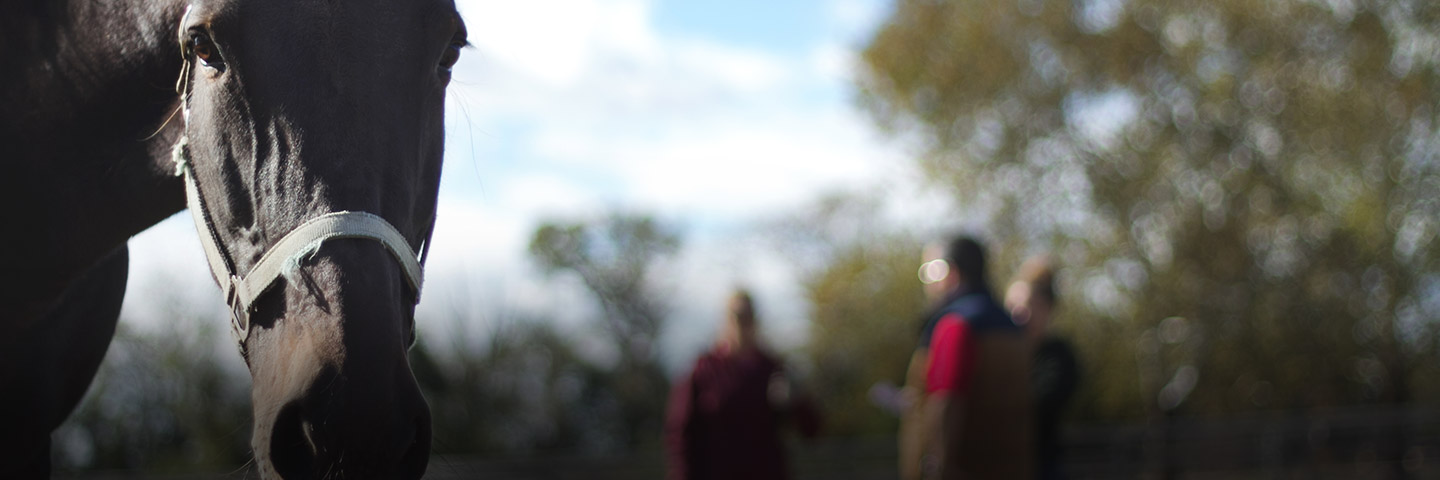Students interested in pursuing careers in the horse industry or just improving their knowledge of horses can study equine science in the Department of Animal Sciences. Students will graduate with a Bachelor of Science with an Animal Science major with an option to track in Equine Science. Students will take all of the equine didactic courses available (see above), courses in marketing, basic sciences and animal science, and also sign up for “hands-on” credits through the Equine Practicum, Research in Animal Science course and/or Cooperative Education.
Our courses tend to emphasize the science of horses—not only “how,” as in many other equine curricula, but “why.” Thirty to sixty students are involved in equine studies each semester at the School of Environmental and Biological Sciences. Students interact closely with their advisors and are given guidance in career decisions.
We have a Memorandum of Understanding with Delaware Valley College wherein our students can take a semester of “how to” classes on topics such as Equine Breeding, Management, Horse Training and Conditioning, Horse Show Management, and Stable Management, to name but a few. These all tend to be very hands-on courses due to the active breeding and horse show programs at Delaware Valley College. Their students come to Rutgers for the “science” of the industry and to get research experience.
Scholarships
NOW ACCEPTING APPLICATIONS
Rutgers Equine Science Center and the Department of Animal Sciences at the School of Environmental and Biological Sciences at Rutgers, The State University of New Jersey, are pleased to announce the availability of financial assistance to undergraduate women who are New Jersey residents majoring in Animal Sciences with a minor in Equine Science.
Questions & Answers
What makes our program unique?
The Equine Program has a strong background in basic science, undergraduate research experience, and exposure to the tremendous variety of horse events and management systems available in New Jersey. Student advising is a high priority. When first-year students declare the Animal Sciences major, the Curriculum Coordinator then assigns an advisor in the major based on option interest and academic strength. Eleven faculty serve as undergraduate advisors.
Does the equine academic program provide scholarships?
Scholarships are available to women who are New Jersey residents pursuing Equine Science at the School of Environmental and Biological Sciences from the Doris C. Murphy Endowed Scholarship in Equine Science. They are awarded to full-time undergraduates based on academic merit, demonstrated interest in equine science, and financial need. Up to six $1,000 scholarships will be awarded each year, at least one to an incoming student, and they may be renewed annually upon approval of the scholarship selection committee. For information, contact:
Equine Science Center
57 U.S. Highway 1
New Brunswick, NJ 08901-8554
(848) 932-9419
Applications are due May 1 of each calendar year.
What types of jobs in the horse industry do graduates hold?
Many go to veterinary school or graduate school; some obtain jobs in the equine industry (feed or pharmaceutical companies, horse farms, media, etc.)
Does the program emphasize a particular area of academics?
The emphasis is primarily on science, with special focus on nutrition, behavior and exercise physiology.
Does the program emphasize a particular theory or philosophy of riding or does it try to give students experience in a variety of riding and training styles and philosophies?
In our classes and independent studies, students are exposed to as wide a variety of philosophies and theories as possible, from dressage to western riding, high level performance horses and racehorses to backyard pleasure horses. We do not have riding facilities and do not teach riding. We do have an intercollegiate equestrian team which trains both for English and Western equitation. Its website is http://rutgers-equestrian.wix.com/rutgers-equestrian-team.
Our students also organize other clubs including the Equine Science Club, Pre-Vet Club, Animal Science Club, and Rutgers Mounted Patrol.
Are there other opportunities for students pursuing equine science?
Rutgers School of Environmental and Biological Sciences is host to the region’s only Equine Science Center, an interdisciplinary program of cutting-edge science based on practical application of knowledge, and delivered to the people of the state through various outreach programs.

